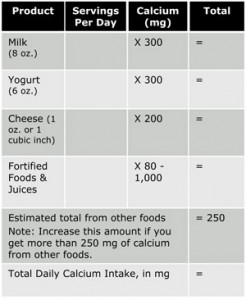What is the calcium content of milk? What is the calcium content of milk? For every 8 ounces of milk served, you get 25 percent of the recommended daily value of calcium. The recommended daily amount of calcium is 1,000 mg, which is based on a healthy adult's 2,000 calorie diet. Even if you can't tolerate dairy products, you can still eat 300 mg a day and take low-dose calcium supplements to supplement the rest. The risk of heart disease and kidney stones suggested by studies should be avoided by keeping supplement intake below 500 mg daily. Average dietary calcium intake for men over 1 year of age is 871-1266 mg. The life stage group was / day; for women, the range was 748-968 mg / day. This contributes to bone loss. For this reason, as you grow older, your body still needs calcium to keep your bones dense and strong. Most experts recommend at least 1,200 milligrams of calcium and 800 to 1,000 international units of vitamin D per day. Your healthcare provider may recommend supplements that provide the calcium and vitamin D you need.
Milk acts as an excellent source of calcium, approximately 300 milligrams per 8 ounces of glass. According to the Federal Dietary Supplement, women between the ages of 19 and 50 need 1,000 milligrams per day and after 51, 1,200 milligrams to meet dietary calcium requirements.
Amount of dairy products to be ingested Sufficient calcium?
As a general rule of thumb, using 2-3 servings of dairy products daily can help keep your calcium intake at near-appropriate levels. One serving is equivalent to 250 ml of milk, 125-150 g of yogurt, or 2 slices (40 g) of cheese. For those who like milk, it's easy to drink a couple of glasses a day.
How much is calcium? With a glass of milk?
Whole milk, 2%, 1%, and skim milk all provide the same amount of calcium – 300 mg per cup. For reference, the recommended daily intake of calcium is 1,000 mg for women under the age of 51 and men under the age of 71. 1200 mg for females over 51 and men over 71. Many people are allergic to milk. Most commonly, it's caused by two specific proteins, casein and whey.
What is the recommended daily intake of calcium for men?
For reference, the recommended daily intake of calcium is 1,000 mg for women under the age of 51 and men under the age of 71. 1200 mg for females over 51 and men over 71. Many people are allergic to milk. Most commonly, it is due to two specific proteins: casein and whey's suspicious practices.
How much calcium do you need to build muscle?
Calcium emits cell signals that cause muscles to contract and move. To keep all these systems in top condition, you need a diet rich in calcium, the body's most abundant mineral. The amount required depends on your age. Women under the age of 50 need 1,000 milligrams (mg) daily. Men under the age of 71 also need 1,000 mg daily.
Can I get enough calcium from milk?
Milk is one of the best and most widely available sources of calcium available. One cup (237 mL) of milk contains 306-325 mg, depending on whether it is whole milk or non-fat milk. Calcium in dairy products is also absorbed very well (52, 53). In addition, milk is an excellent source of protein, vitamin A, and vitamin D.
What can I eat to get 1000mg of calcium?
The best sources of calcium are dairy products such as milk, yogurt and cheese, and calcium-fortified beverages such as almonds and soy milk. Calcium is also found in dark green leafy vegetables, dried pea and beans, bone-in fish, and calcium-fortified juices and cereals.
Do humans need milk for calcium?
Dairy products are the best source of calcium, which is the major mineral in bone. For this reason, health authorities recommend dairy products daily.

Below you will find two helpful answers on a similar topic. 👇
How can I get 1000 mg of calcium a day?What kind of animals eat bones?
